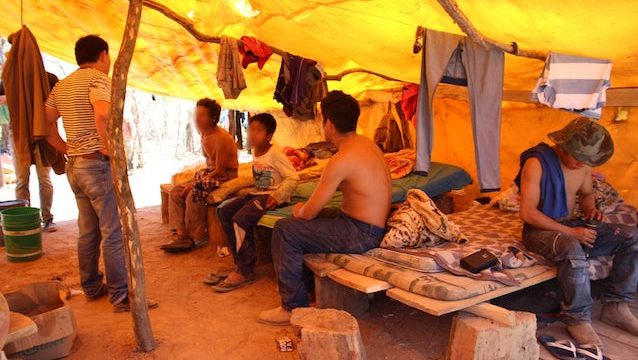The Chaco region of Paraguay covers more than half of the country’s land. As an environment resistant to drought and excessive heat, the Chaco has become home to an ever-expanding cattle farming and agriculture industry.
Yet as the region has become an export hub for Paraguay, exporting meat, soybeans, and leather to the rest of the world, labor conditions in the Chaco have come into focus.
Related Campaign: Help end forced labor.
Besides reports of illegal deforestation, forced labor among the indigenous communities is endemic.
The Guardian reports:
So far only one case has actually resulted in a conviction. In November 2016 on a farm called Estância Ruroka, government inspectors found 35 people working and living in inhumane conditions on a farm in the department of Boquerón, near the border with Bolivia.
The workers were Aché people recruited nearly a thousand kilometres from their communities to produce charcoal from native forest felled to prepare the way for grassland. The group included children and adolescents with injuries on their hands caused by the charcoal kilns.
Sleeping on mattresses on the ground and protected from the sun only by plastic tarpaulins, the group did not have enough drinking water to quench their thirst, though temperatures can reach 50C in the Chaco. The workers were also in debt to pay for food from the recruiters. In an attempt to save money, they even went without dinner.
The inspection was carried out by the public prosecutor’s office after they received a complaint. “The situation needs to be under much stricter control,” says Teresa Martínez, Paraguay’s public prosecutor.
“If it’s not watched, these things will continue to happen. In this case, we went because they asked for help. But we have a problem: the inspectors cannot enter without a warrant. And for us to get this warrant, we need to intervene [through the courts].”
Separately, an investigation by NGO Reporter Brasil and the Guardian found that the same farm, Estancia Ruroka, was linked to supplying some of the world’s largest car firms — BMW, Citroën, Peugeot, and Renault — with leather. They were sold leather via Cencoprod, a company run by the three Mennonite cooperatives that dominate the economy of the Chaco. One of these cooperatives, Chortitzer, counts the farmer convicted of trafficking as one of their associates.
BMW said it was unaware of the trafficking conviction, but confirmed that one of its leather suppliers purchased materials from Cencoprod. “In cases like this, we conduct an investigation with our direct supplier to check the facts,” said a BMW representative.
With European firms relying heavily on Paraguayan leather — Italy alone imported hundreds of tons last year — it is high time to stop ignoring labor abuses at the bottom of their supply chains. While the Chaco region is under-regulated, the risk of forced labor cannot be swept under the rug.







Freedom United is interested in hearing from our community and welcomes relevant, informed comments, advice, and insights that advance the conversation around our campaigns and advocacy. We value inclusivity and respect within our community. To be approved, your comments should be civil.